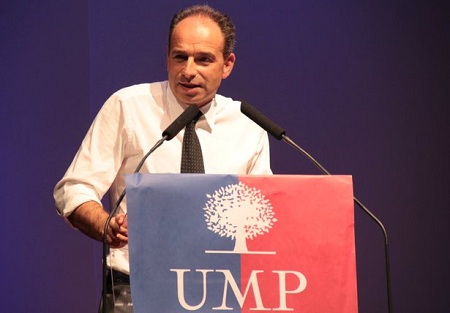After a tense Monday during which both candidates declared victory and accused the other of fraud, it appears that Jean-François Copé (pictured above) has emerged as the presumptive leader of the French right.![]()
With just a 98-vote margin, Copé won the election for general secretary of the center-right Union pour un mouvement populaire (UMP, Union for a popular movement) of former president Nicolas Sarkozy, after an election held among UMP members on November 18. Copé defeated former prime minister François Fillon by about 50.03% to 49.97%.
Although Copé has served as general secretary since 2010, this election has taken on significant importance as a proxy fight not only for the upper hand to win the UMP’s 2017 presidential nomination, but as a proxy fight for the future of the French right. Fillon, a cosmopolitan and relatively moderate figure, was viewed by the French public as more serious about government than Sarkozy, and it was Fillon who pushed through many of Sarkozy’s reforms as the head of his government. Fillon, generally speaking, is more popular among the French electorate than Copé.
So there’s good cause for the French right to be worried about Copé’s victory. Here are four reasons why.
A split, acrimonious vote means no unity for Copé. This was perhaps the worst way for Copé to win — the narrowest of margins in an acrimonious contest against a popular former prime minister. The vote has exposed dueling camps within the UMP, one that’s a steady-as-she-goes moderate right personified by Fillon, and another that’s a more full-throated cultural right personified by Copé. While both parties largely agree on economic policy, which will be the chief terrain over which the battles of the next five years will likely be fought (to say nothing of the 2017 presidential election), the two sides disagree on tone and the issues that the UMP should emphasize. It doesn’t help that the voting’s gone off like an amaetur club contest — Fillon decided not to contest the result, but not without both sides giving voice to ballot-stuffing. The whole contest paints the UMP as a movement less than ready to assume the reins of government, let alone committed to a single strategy to return to power.
Copé’s sucess further validates Marine Le Pen. Copé attacked Ramadan during the leadership campaign and complained about ‘anti-white’ racism. It should go without saying that the Front national (FN, National Front) led by Marine Le Pen in the last presidential election, is setting the agenda of the broader French right with a greater emphasis on immigration, crime, nationalism and other cultural issues. But it’s worth repeating. Copé’s tactics — along with many of Sarkozy’s, from his time as minister of the interior in the mid-2000s to the 2007 presidential race through his presidency — are clearly influenced by the notion that France’s center-right is in danger of being overtaken by Le Pen’s far right. But Copé’s election only serves to legitimate the terms of Le Pen’s platform and bring her and the FN within what’s accepted as mainstream. With local and European elections coming in 2014, Le Pen stands an excellent chance of gaining voters from UMP-inclined voters put off by the current infighting, notwithstanding Copé’s election.
Copé’s victory cedes the political center to Hollande. This also should go without saying, but with the UMP empasizing issues like ‘anti-white’ racism or immigation, it will have much less credibility in making the case against French president François Hollande and the government of Parti socialiste (PS, Socialist Party) prime minister Jean-Marc Ayrault. Although Hollande’s popularity is already sinking, it’s sinking because of austerity measures — both budget cuts and tax increases — and an economy that’s nearly (if not already) in recession. If anything, Hollande’s taken more criticism from the left in that he’s made trimming France’s budget deficit his top priority so far in office. And, of course, 2017 is light-years away in political time. But Copé’s victory will give Hollande the ability to dominate the center of French politics for the foreseeable future.
Copé could be a stalking horse for Sarkozy. Sarkozy, who indicated he’s leaving politics for good after losing the presidential election earlier this year, could benefit most of all from the UMP’s tumult — and Sarkozy’s own tacit encouragement for Copé’s candidacy indicates that Copé, whose style greatly emulates that of Sarkozy’s, could well be a placeholder for Sarkozy’s eventual return to frontline politics. While there’s really no way of knowing whether a Sarkozy re-emergence would be good or bad for the French right, it bears noting that the presidential race was more of a rejection of Sarkozy’s presidency than the embrace of Hollande’s program.

One thought on “Four reasons why Cope’s narrow Sunday win of France’s UMP leadership could be ruinous”